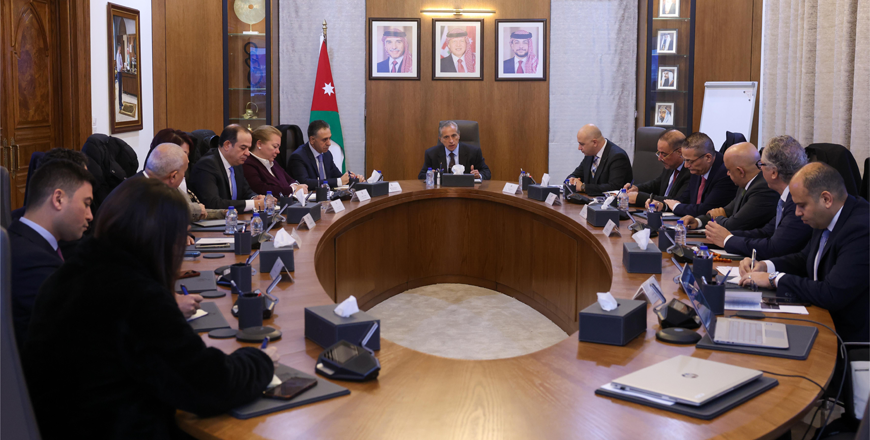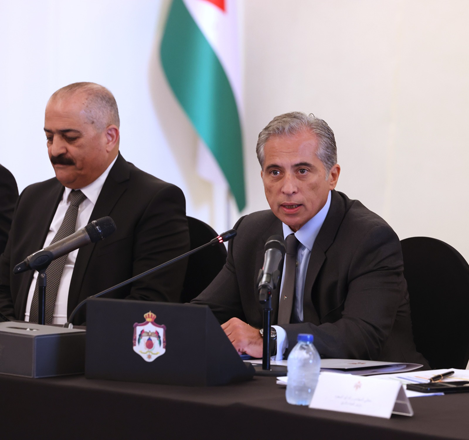You are here
Prime minister meets investors, business leaders, underlines their role in realising economic modernisation vision
By JT - Nov 10,2024 - Last updated at Nov 10,2024

Prime Minister Jafar Hassan addresses a gathering of investors and business leaders during a discussion hosted by the Jordan Strategy Forum (Petra photo)
- Hassan says increasing investment top priority for government
- He says gov't aims to develop Jordan's gas, renewable energy sectors, establish food industry development zones
- Prime minister unveils 'accelerated' initiatives to digitalise public services, simplify administrative processes, remove bureaucratic barriers
AMMAN — Prime Minister Jafar Hassan said on Sunday that Jordan's vision for economic modernization was inspired by His Majesty King Abdullah and shaped collaboratively by stakeholders across sectors.
Addressing a gathering of investors and business leaders during a discussion hosted by the Jordan Strategy Forum (JSF), Hassan said, "This is a joint project that we have all contributed to, and together we will implement."
Underscoring the government's commitment to working with the private sector, the premier emphasized that all relevant sectors and the government's economic team were involved in developing the modernization vision, according to the Jordan News Agency.
"We are working within a clear timeline, guided by priorities, measurable outcomes and a shared agenda," he said. "Every day is important in driving progress, and the government team is working in full harmony to achieve this vision."
The prime minister identified two strategic priorities for the government which are increasing investment to boost economic and employment opportunities, and reducing the medium-term cost of servicing external debt.
He noted progress on key projects, including the National Water Carrier and the National Railway, which links Aqaba, Maan and the southern Dead Sea area, and will provide opportunities for the industrial, energy and contracting sectors.
Hassan emphasized that these initiatives are primarily funded by foreign investment, although local investors are also encouraged to participate.
He also highlighted plans to further develop Jordan's gasoline and renewable energy sectors, noting that electricity demand is expected to grow by more than 30 per cent over the next six years.
The government is also focusing on supporting industrial and export funds, establishing food industry development zones, and implementing tariff protection for local products to stimulate growth, expand exports, and improve food security, he added.
Hassan expressed optimism about increasing service exports, particularly in information technology, in the coming years.
On the government's digital transformation efforts, Hassan announced accelerated initiatives to digitize public services, simplify administrative processes, and remove bureaucratic barriers to benefit citizens and investors alike.
Several digital projects are expected to be completed within the next two years, he said.
Throughout the discussion, forum members offered suggestions for strengthening public-private partnerships, emphasizing that stable regulations are critical to building investor confidence. They also suggested the creation of a private sector-led investment fund to support major government projects.
Participants raised other issues, including the informal economy, budget priorities, public debt management, stock market performance, public-private partnership legislation, the new city initiative, energy, food security, pharmaceutical manufacturing, export support, and financing mechanisms for ongoing projects, including Islamic finance options.
Related Articles
AMMAN — Prime Minister Jafar Hassan on Sunday stressed the importance of partnership with the private sector in all major and strategic projects prioritised by the government in 2025, contributing to added value for the national economy.
AMMAN — Minister of Investment Muthanna Gharaibeh on Wednesday announced that the ministry is implementing an integrated plan to streamline
AMMAN — Prime Minister Jafar Hassan on Tuesday outlined a strategic plan to accelerate the development of the northern city of Irbid, priori



















